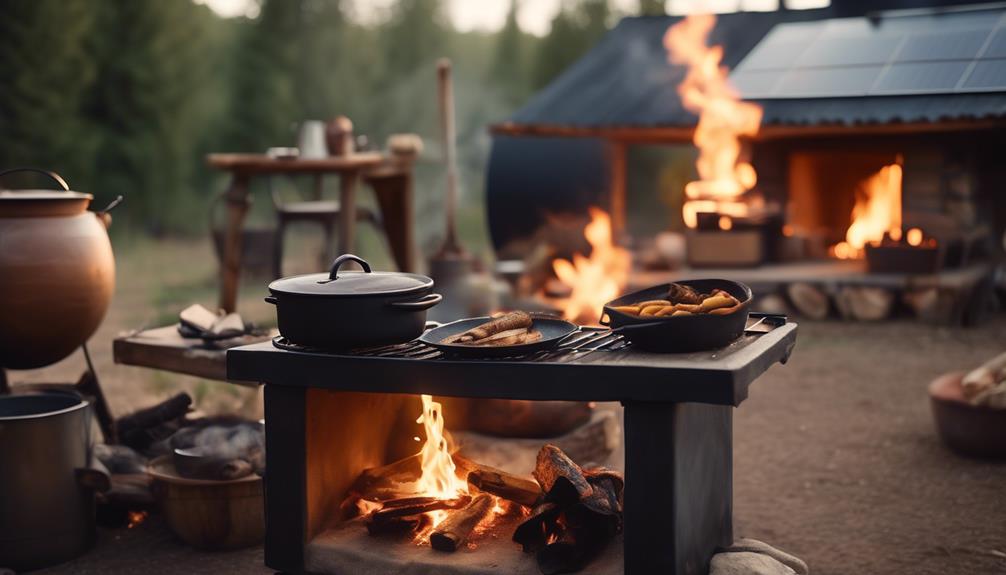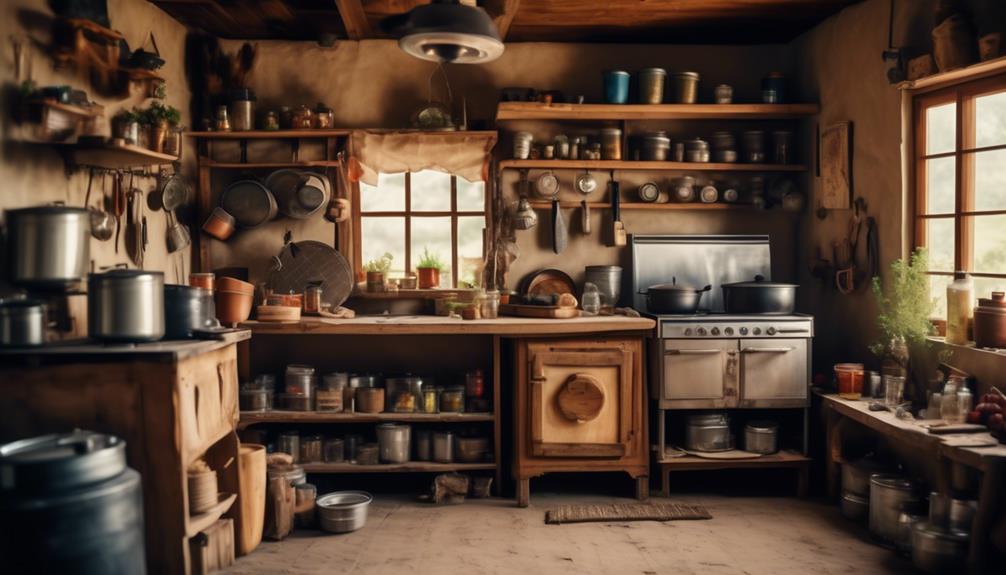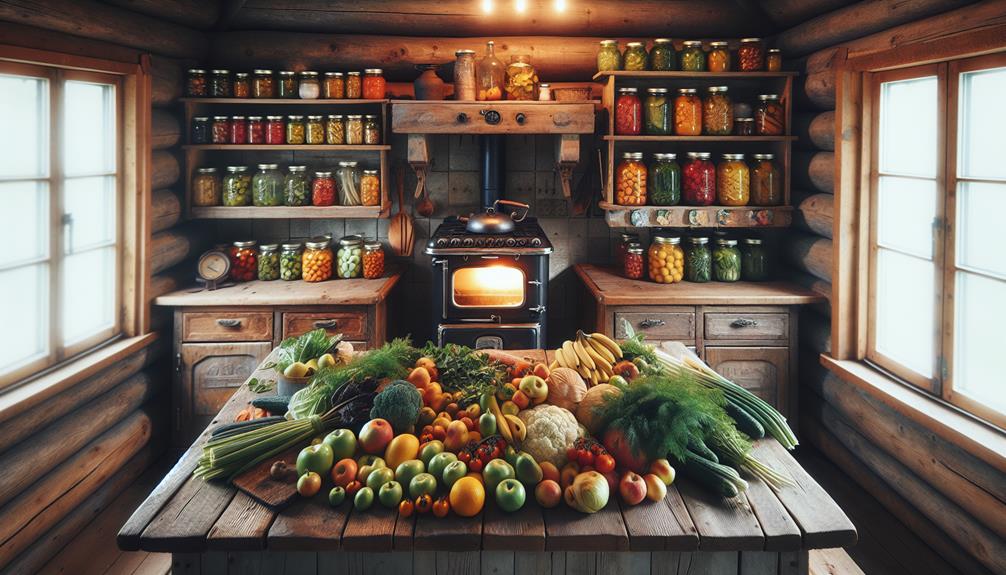Curiosity piqued and a quest for sustainable living ignited, I embarked on a journey to uncover the secrets of an off-grid kitchen. As someone who has always been intrigued by the possibilities of self-sufficiency, I found myself enticed by the idea of breaking free from the shackles of reliance on electricity.
In this exploration, we will unravel the mysteries of solar power, discovering how it can not only power an entire home but also revolutionize the way we cook. But that's not all – we will delve into alternative cooking methods and reveal the must-have tools and supplies for an off-grid kitchen.
Get ready to unlock the secrets of an off-grid kitchen, as we embark on this extraordinary journey together.
Key Takeaways
- Solar power is a viable option for powering an off-grid kitchen, whether for the entire home or just the kitchen directly.
- Tiny houses with lower power consumption are particularly well-suited for solar power.
- Inverter, generator, and battery backup systems are necessary components of a solar power setup.
- Wood stoves and propane can be used for cooking and heating in an off-grid kitchen.
Powering an Off-Grid Kitchen
To power an off-grid kitchen, solar panels can be installed either for the entire home or specifically for the kitchen, offering a sustainable and renewable energy source. Solar panel installation is a practical and eco-conscious choice for those who desire innovation in their off-grid kitchen.
When determining the wattage needed for the solar panels, consider the number of appliances in the kitchen. For tiny homes with lower power consumption, solar power is a realistic option.
To ensure a reliable power supply, a quality inverter, generator, and battery backup system are necessary. By harnessing the power of the sun, an off-grid kitchen can operate efficiently and reduce its environmental impact.
Solar panels provide a clean energy solution for cooking, heating, and powering appliances in an off-grid kitchen.
Installing Solar to Power an Off-Grid Kitchen
When considering the installation of solar panels to power an off-grid kitchen, it's important to assess the wattage needed based on the number of appliances in the kitchen, ensuring a practical and sustainable energy solution.
Choosing the right solar panel system for an off-grid kitchen is crucial for optimal performance and efficiency. Look for panels with high conversion rates and durable materials.
Additionally, consider the benefits of battery backup systems for off-grid kitchens. These systems store excess energy generated by the solar panels, allowing you to power your kitchen even when the sun isn't shining. Battery backups provide a reliable and continuous power source, ensuring uninterrupted functionality of your appliances.
Using Alternative Cooking Methods in an Off-Grid Kitchen

One practical and eco-conscious alternative cooking method for an off-grid kitchen is using wood stoves, which offer versatility and efficiency for cooking and heating. Cooking with renewable energy sources like wood isn't only sustainable but also allows for self-sufficiency.
Here is a comparison between wood stoves and propane for off-grid cooking:
- Wood stoves:
- Can be used for cooking, heating, and food preservation.
- Provide versatile cooking options.
- Help heat the entire kitchen.
- Utilize renewable and readily available wood as fuel.
- Propane:
- Offers a portable and easy-to-use option.
- Requires propane tanks for fuel supply.
- May need to be replenished regularly.
When considering off-grid cooking, wood stoves are a greener choice that can provide warmth, delicious meals, and the satisfaction of cooking with renewable energy.
Ideal Kitchen Appliances That Don't Use Electricity
I highly recommend incorporating these ideal kitchen appliances that operate without electricity into your off-grid kitchen setup.
When it comes to choosing the right non-electric appliances for an off-grid kitchen, there are a few factors to consider. Firstly, propane stoves offer several benefits over wood stoves. They're efficient, easy to use, and provide consistent heat for cooking. Propane is also a portable fuel source, making it convenient for off-grid living.
Additionally, there are other non-electric appliances worth considering. The Gas One Butane Stove is portable, quick, and versatile, perfect for outdoor cooking. The GoSun Fusion Solar Oven utilizes solar power to cook food, even at night. The Majolica Wooden Cook Stove is efficient and heats up quickly. And the Eccotemp Hot Water Heater provides hot water for your off-grid kitchen needs.
Must-Have Equipment and Supplies for an Off-Grid Kitchen

To create a functional and eco-conscious off-grid kitchen, it's essential to equip yourself with the must-have equipment and supplies that will ensure sustainability and efficiency in your daily cooking routine. Here are four items that are essential for off-grid cooking:
- Cast iron and stoneware tools and cutlery: These long-lasting and heat-resistant tools are perfect for cooking on a wood stove or propane-powered stove.
- Dutch oven: A versatile and essential tool for an off-grid kitchen, a Dutch oven can be used for baking, roasting, and simmering delicious meals.
- Berkey water filter: To ensure clean and safe drinking water, a Berkey water filter is a sustainable solution that doesn't require electricity.
- Lavario Portable Washer: This manual washer runs off the grid and is perfect for washing dishes and other kitchen supplies.
Additional Tips for an Off-Grid Kitchen
For an off-grid kitchen that's both efficient and environmentally-friendly, consider implementing these additional tips to enhance your sustainable cooking experience.
Off-grid kitchen organization is key to maximizing space and minimizing waste. Opt for stackable and collapsible storage containers to save space in your kitchen cabinets. Use hooks and hanging baskets to keep utensils and cooking tools within easy reach. Utilize vertical space by installing shelves or a pegboard on your kitchen walls for storing pots, pans, and other cookware.
When it comes to off-grid kitchen waste management, composting is a great way to reduce landfill waste and create nutrient-rich soil for your garden. Set up a composting system using a compost bin or a DIY compost pile. Separate food scraps from non-compostable items and turn them into valuable resources for your off-grid lifestyle.
Frequently Asked Questions
How Much Does It Cost to Install Solar Panels for an Off-Grid Kitchen?
It's important to consider the cost of solar panel installation for an off-grid kitchen. Factors like the size of the system and location can affect the price, but it's a worthwhile investment for sustainable and renewable energy.
Are There Any Government Incentives or Tax Credits Available for Installing Solar Power in an Off-Grid Kitchen?
There aren't any government incentives or tax credits available for installing solar power in an off-grid kitchen. However, the long-term cost savings and environmental benefits make it a worthwhile investment.
What Are the Maintenance Requirements for a Wood Stove in an Off-Grid Kitchen?
Maintenance requirements for a wood stove in an off-grid kitchen include regular cleaning procedures to remove ash and creosote buildup. It's important to inspect and clean the chimney regularly to ensure proper ventilation and safety.
Can I Use Solar Power to Run a Refrigerator in an Off-Grid Kitchen?
Sure, solar power can be used to run a refrigerator in an off-grid kitchen. However, it's important to consider solar power efficiency and alternative refrigeration options like propane or even root cellars for longer-term storage.
Are There Any Safety Precautions or Considerations When Using Propane in an Off-Grid Kitchen?
When using propane in an off-grid kitchen, it's important to take safety precautions into consideration. Proper ventilation, regular maintenance of propane appliances, and awareness of gas leaks are essential for a safe and efficient propane usage.
Conclusion
In conclusion, the secrets of an off-grid kitchen are waiting to be unlocked. By harnessing the power of solar energy and embracing alternative cooking methods, we can create a self-sufficient and environmentally friendly kitchen.
With the right equipment and supplies, we can enjoy the benefits of off-grid living while reducing our reliance on the grid. So, why not embark on this exciting journey and discover the hidden potential of an off-grid kitchen?
Start your sustainable and practical kitchen adventure today!

